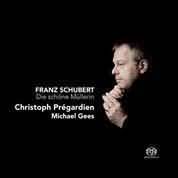There seems to be a trend these days to inject a little extra character and drama into live performances of Schubert’s song-cycle Die schöne Müllerin, not only employing a stage actor’s movements, gestures, and facial expressions, but altering tempos of certain song verses and using greater contrasts of dynamics for emotional/expressive effect. If done with consummate understanding of the German poetry and with a true, consistent sense of who this narrator is, it can be quite captivating and moving (as it was in a recital I recently heard with young Canadian-American tenor Philippe Castagner). On this new recording, the trend is uniquely translated to disc–not with the abovementioned stage-drama, but rather with the fluid and generous addition of melodic embellishments.
Christoph Prégardien is unquestionably one of the world’s finest tenors and most experienced recitalists, and it would be difficult to fault his vocalism throughout this technically solid and interpretively engaging traversal of Schubert’s scenic/dramatic/character-centric masterpiece. But I probably will not be alone in my (slightly) adverse reaction to the singer’s decision to embellish Schubert’s exquisitely crafted melodies with ornamental twists and turns that, particularly if you’re familiar with these songs, make more of an impression as little self-indulgent distractions than as interesting or artful enhancements. These are not the sort of melodies that invite or require decoration, nor is there any established tradition for doing so. (The basis for Prégardien’s stylistic approach lies in Diabelli’s 19th-century edition of Schubert’s cycle, which included written-in embellishments by contemporary singer Johan Michael Vogl, a friend and colleague of Schubert.)
I don’t mean to make too much of Prégardien’s insertions and changes, although concerning such a familiar and oft-performed repertoire staple, it’s impossible not to–and the liner notes do give considerable space to the topic; but listeners who know these songs will note such alterations as the octave interpolation in “Tränenregen”; the gratuitous little run at end of “Am Feierabend” and turn at the end of “Der Neugierige”; the too-fast tempo of “Die liebe Farbe” and its numerous melodic changes, including a descending passage instead of an ascending one–and how the pianist, who occasionally playfully echoes the tenor’s embellishments in the accompaniment, here throws in an unwritten hesitation just before the last chord; and the rushed, final lullaby “Des Baches Wiegenlied”.
The good news is that these songs are so beautifully, confidently, and eloquently sung that once you’re aware what Prégardien is up to, you can just focus on and enjoy the pure pleasure of the singing. The bad news is that, like all embellishments, which are supposed to be a spontaneous, transitory feature of a given (live) performance, they lose their improvisatory uniqueness–and thus effectiveness–after multiple hearings on a recording. What was intended as momentary and relatively unimportant becomes fixed and “important” by virtue of its recorded permanence. It’s a distraction that in this case actually makes the songs seem more lightweight and less profound than they truly are. (According to the liner notes, one of the purposes of Vogl’s additions and alterations–he even “simplified” some of the melodic lines–was to make the new edition “resonate” most favorably with the public.)
Fans of Schubert lieder–and certainly of Prégardien–will be interested in these unique interpretations, recorded in very fine studio-based sound; and as suggested above, pianist Michael Gees is an extraordinarily responsive partner, niftily playing off of the tenor’s changes. Listeners new to this song cycle should begin with one of the reference versions.
































